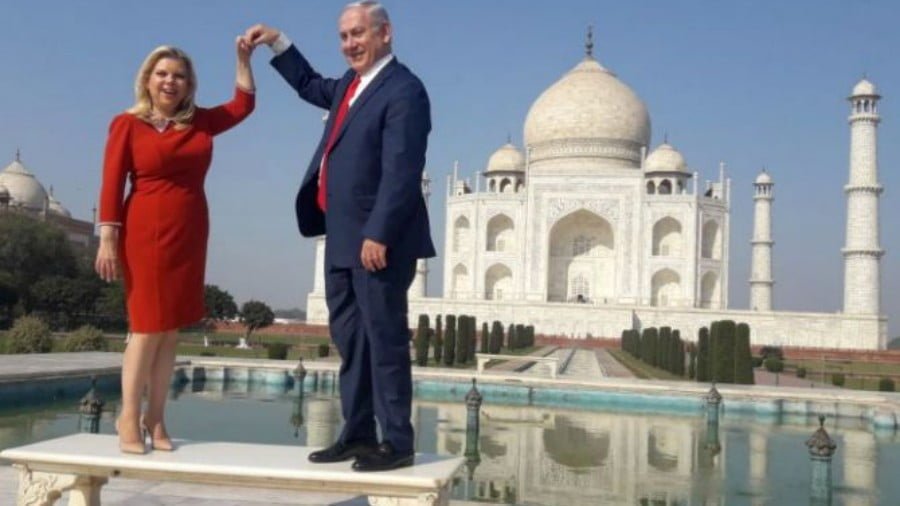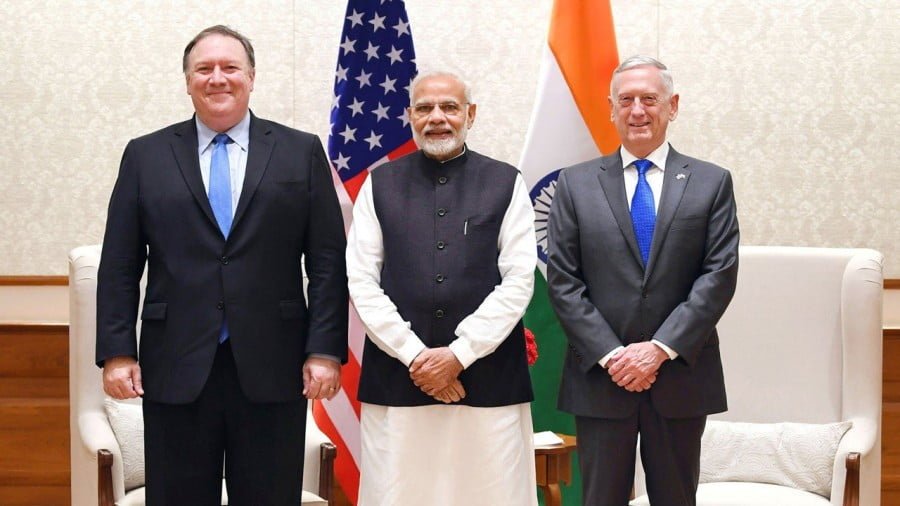Netanyahu Visit Strengthens Israel-India Alliance Dominated by Mutual Interest in Guns and Religious Hate
Bibi Netanyahu began a six-day visit to India earlier this week, which was his first to the nation, and only the second by an Israeli premier in the State’s history (Ariel Sharon visited in 2003). Last July, Prime Minister Narendra Modi became the first such Indian leader to visit Israel. All this marks an increasing confluence of interests between the two countries marked by their mutual:
· Occupation of Muslim-majority lands
· Hostility toward their respective Muslim minorities;
· Ascendancy of a militant religious extremism;
· Ever-expanding appetites for advanced military systems required to maintain dominance over (Muslim) regional enemies.
It was not always so. Before the Hindu nationalist BJP Party came to power, India was a leader of the non-aligned movement, which sought a middle-way between the two dominant super-powers. India, in those days, was closer to the Soviet Union. It championed the rights of former colonies (like itself) to rid themselves of their former masters and strike out on their own. As such, it championed the rights of Palestinians. India was the first non-Arab state to recognize the PLO. It didn’t even establish full diplomatic relations with Israel till 1992 (although it had recognized the state as early as 1950).
Gandhi’s Rejection of Zionism
A good deal of India’s early view of Israel was influenced by Mahatma Gandhi’s rejection of Zionism, which Peter Speetjen’s has recounted in an article here. He maintained these views despite an intensive effort by some of his Jewish followers and Zionist leaders to draw him to the cause. Gandhi’s criticism of Zionism is quite prescient given the current circumstances in which Israel finds itself. He believed that no nation should be founded solely for the benefit of a single religion. This is why he campaigned so assiduously against Partition in 1948; and why the subsequent division of India and Pakistan and the mass expulsions and slaughter of Hindus and Muslims caused him deep pain. Gandhi’s vision was one of religions co-existing peacefully within a single state.
Israel’s current status as a nation which privileges its Jewish majority and subjugates its Muslim minority would be anathema to Gandhi. And he clearly saw the handwriting on the wall as early as 1937-8, when he first recorded his views of the conflict between Jews and Arabs living precariously in Mandatory Palestine.
Once Hindu nationalists came to power over the past two decades, Gandhi’s legacy was banished (keep in mind that he was assassinated by a Hindu nationalist extremist who belonged to a militant group whose successor was the BJP). In Prime Minister Narendra Modi’s home state of Gujarat, 1,100 Muslims were massacred while he was state governor. In 1992, Hindu mobs also destroyed the historic Babri Mosque, because it had been erected on the site of an ancient Hindu temple.
This, in particular, is significant in the Israeli context because of increasing militancy by Jewish settlers who wish to rebuild the Holy Temple on a site which now houses the Haram al-Sharif, the third holiest site in Islam. Though they rarely speak clearly about their true goal, it would necessary in order to rebuild the Temple to raze the Muslim holy sites.
India has, for decades, occupied Muslim-majority Kashmir against the will of its residents, who prefer affiliation with Pakistan. India’s occupation has been brutal and it has employed many of the same tactics used by Israeli Occupation forces. As an example, Indian forces tied Muslim citizens to the hoods of their jeeps and paraded them through Kashmiri streets as an act of humiliation to break the will of the protesters.
Israeli Border Police have similarly tied children to the hoods of jeeps and driven through protesting Arab villages in order to quell violence and rock throwing. In at least one instance, Israeli troops seeking to arrest a wanted militant (whom they feared would fire at them when they tried to detain him) kidnapped a young boy and placed him in front of their column. The militant couldn’t fire at them without hitting the boy. While this act was a grievous violation of international law, it did protect the Israelis from taking fire. International law and common decency be damned when it comes to protecting the troops.
Israel and India: Satiating an Appetite for Advanced Weapons Systems
Just as Israel has built up a world-class weapons industry in order to arm its forces in their fight against neighboring Arab states, India too requires billions in advanced weaponry both to maintain its occupation of Kashmir and to arm itself against its longtime (Muslim) adversary, Pakistan. This has led Israel to become India’s leading arms supplier. Just before Modi’s visit to Israel the two countries announced the largest single arms deal in Israel’s history: $2-billion.
The relationship has not always gone smoothly, as one Israeli weapons manufacturer was accused of bribing a defense minister (Israeli anti-bribery laws are not enforced regarding arms exports) and banished from the Indian weapons market for ten years. Last month, the Indian government announced cancellation of a $500-million drone deal with an Israeli manufacturer, which was quite a blow to the company’s bottom line. But in a deft bit of maneuvering, a different Indian government entity came along and rescued the package.
Narendra Modi is deft enough politician to realize that he should acknowledge his country’s 200-million Muslims and India’s pro-Palestine tradition by throwing a sop to the Palestinians. That’s why he announced on Wednesday that he’d be traveling to Jordan and Palestine next month. It will be the first visit of an Indian PM there. He certainly will do little there that will upset his bro, Bibi Netanyahu. Nor can Palestine offer him any of the weapons or trade deals he secures via an alliance with Israel.
India and Israel as Nuclear Weapons States
Finally, both Israel and India became nuclear-armed states in order to have a fail-safe weapon for use against their regional enemies should they face an existential threat. Though neither has used such weapons, Israeli officials have seriously contemplated using them during military crises. In nuclearizing, each country has fueled tremendous fear among regional rivals. In Pakistan’s case, it spurred the state to develop its own Bomb (another Indian rival, China, already had nuclear weapons). In the case of Iran, it has spurred that country to engage in a nuclear program which could potentially lead to development of a nuclear weapon in the future. Despite the original conception that getting the Bomb offered deterrence and protection, attaining WMD has further destabilized the region.
Bibi Netanyahu’s cultivation of India coincides with a similar bromance he’s developed with the region’s Sunni states led by Saudi Arabia. Throughout its history, Israel has sought to penetrate the Third World, seeking allies in its existential battle against the Arab states. Now, in Netanyahu’s eyes, a strategy first enunciated by David Ben Gurion, the Periphery Doctrine, has come to fruition: Israel has new allies in the Arab world fighting their mutual enemy, Iran; as well as India, which is also fighting an existential battle against Pakistan-inspired Islamist extremism (at least as Prime Minister Modi and his Hindu followers see it).
Another similar set of alliances Netanyahu has cultivated involves far-right European movements which are anti-immigrant and Islamophobic. MKs from his Likud Party routinely host delegations from countries like Russia, Hungary and elsewhere who espouse anti-Semitic views. The prime minister himself recently visited Viktor Orban’s Hungary just as the latter was spouting anti-Semitic rhetoric against Jewish Hungarian-American, George Soros. Instead of cancelling his visit or defending Soros, Netanyahu went on the attack because the billionaire financier funds human rights groups in Israel seeking to promote Palestinian rights.
Netanyahu has always been a politician who seeks short-term advantage over long-term goals. He has a tactical, rather than a strategic mind. His cynical exploitation of the Islamophobic and anti-Semitic prejudices of his allies may offer short term benefits, but it can never build long-term alliances which will stand the test of time and shifting allegiances. As the U.S. saw in Afghanistan after its Mujahedeen allies triumphed over the Russians, friends can become enemies overnight. And once they do, because they know your weaknesses (and strengths) they can become even more formidable enemies.
By Richard Silverstein
Source: Patreon







